by Jerry Gordon and Lt. Gen. Abakar M. Abdallah (February 2023)

Chad President General Mahamat Idriss Déby Itno
October 20, 2022 in Chad’s capital of N’Djamena erupted in violence by security forces perpetrated against thousands who rallied in a call by the country’s leading opposition parties, Les Transformateurs and Wakit Tama protesting the regime’s failure to transfer power to a civil democratic government. Instead, interim President Mahamat Idriss Déby Itno of the Transitional Military Council declared himself President extended the transitional period declared on April 21, 2021 to an elected government from the original 18 months to two years allowing him to run for office in elections. He is the son of the late Idriss Déby, the country’s long-term strongman. He was an ally of the US, France who provided Chadian forces to bolster the G5 Regional anti- Jihadist Sahel Joint Force operating in sub-Sahara Africa. President Idriss Déby succumbed to mortal injuries on April 20, 2021 sustained in combat against The Front for Change and Concord in Chad (FACT) a political military rebel group founded by Mahamat Mahdi Ali in 2016 seeking the overthrow of the elder Déby’s government. FACT had been supported by the Libyan National Army of Field Marshal Khalifa Haftar.
50 were killed, including 10 security force members, and over 300 injured in the October 20th repression of protesters. The Chadian Convention on Human Rights (CTDH) reported over 600 arrests in the wake of the October 20th actions. 262 people had been sentenced to between two and three years in prison and another 80 people to one to two years on charges of “unauthorized gathering, destruction of property, arson, and disturbing public order” during pro-democracy protests on Oct. 20th. Many of those convicted will serve their terms in the notorious Koro Toro maximum security prison in the in southern Borkou-Ennedi-Tibesti desert region of Chad, located 370 miles north of the capital of N’Djamena. Foreign Policy reported that “four protesters were killed at the gates of the U.S. Embassy.” The U.S. ambassador posted photos of the bloody scene outside the embassy gates on the embassy’s Facebook page, comparing it to atrocities his parents faced in Europe during World War II. “May none of us ever again have to clean our streets from blood,” he wrote.
“The government claimed that the demonstrators, with the support of “foreign powers” that it did not name, had planned an “insurrection” to overthrow the government and that they had begun to violently attack and ransack institutions before the forces of order began to repress.”
Prime Minister Saleh Kebzabo, an ex-opposition leader appointed by President Déby, told AFP that his country accepted the principle of an “international investigation” under the aegis of Chad’s “partners. The chairman of the African Union (AU) commission, Chadian Moussa Faki Mahamat, stressed “the urgency of conducting a serious and credible investigation” to bring those responsible to justice
The two leaders of the opposition parties involved in organizing the protest rallies, Succès Masra of Les Transformateurs and Max Loalngar of Wakit Tama—an umbrella citizen opposition group – went into hiding given the manhunt by Chadian security forces. Paris lawyers for Masra and Les Transformeurs Vincent Brengarth and William Bourdon announced that they had sent the International Criminal Court at The Hague a “report of facts likely to qualify as crimes against humanity.”
In a mid-November, 2022 report, AFP cited Loalngar, speaking by cell phone while in hiding from the “ suppression” saying: “Since October 20th, the security forces have been going from house to house, picking up everybody.” “Every morning, bodies are fished out of the Chari river in N’Djamena, and others are buried in the desert” echoing allegations, which are impossible to confirm, circulating on social media.
Foreign Policy disclosed that the US embassy had been involved in a plot to extricate Masra from Chad called “Operation Moses”. However, he was somehow able to avoid capture and leave the country, crossing over into Cameroon and ultimately make his way to Washington to attend meetings on the sidelines of the Biden Administration ‘s three-day African Summit involved 50 nations. Ironically, Chad President Mahamat Idriss Déby Itno was invited attended to the Summit, while other troubled African autocracies – Mali, Guinea, Burkina Faso, and Sudan- were not invited. The report noted why Chad’s leaders was invited by the Administration to the African Summit notwithstanding the October 20th violent “suppression” of the opposition.
“Chad is an important partner when it comes to security in the Lake Chad Basin, and it has a geopolitical important position between East Africa, Central Africa, and the Sahel region,” said Kamissa Camara, Mali’s former minister of foreign affairs from 2018 to 2019—before Mali itself underwent two back-to-back military coups in 2021 and 2022. “I believe that because of the strategic position that Chad has in the region, it was important that the country be invited [to the summit]. It’s just being realistic.”
Masra in a December 8, 2022 France 24 interview in Washington, DC gave vent to his anger at the actions of President Mahamat Déby asserting that: “Millions of Chadians no longer want a dynastic succession.” From his exile in Washington, Masra “hopes to be able to convince members states if the UN and European Union, to react to the political situation in Chad.” He was accused the son of the late Chad strongman Idriss Déby and the junta of being behind the protests, while he had been offered the post of prime minister. Masra asserted “no one can believe the lies of the generals led by Déby junior, who lied to the whole world (…) and to the Chadian people”. Nevertheless, he affirmed that “Déby junior” had already planned to ask him to be his Prime Minister last June, on condition of accepting a dynastic succession in the country, which Masra refused. Masra also implied that some Christians who came from the south of Chad for the October 20th protests had been killed. He suggested that “Mahamat Idriss Déby wanted to provoke a civil war, to better dominate the country.”
In retrospect, given the events that occurred on October 20th, these comments by French President Macron about transition to a democracy in Chad at the state funeral for the late President Idriss Déby in N’djamena on April 21, 2021 appear ironic: “France will also be there to keep alive without waiting the promise of a peaceful Chad creating a place for all of its children and components. The transition will have this role to achieve stability, inclusion, dialogue and democratic transition. We are and will stand alongside you.”
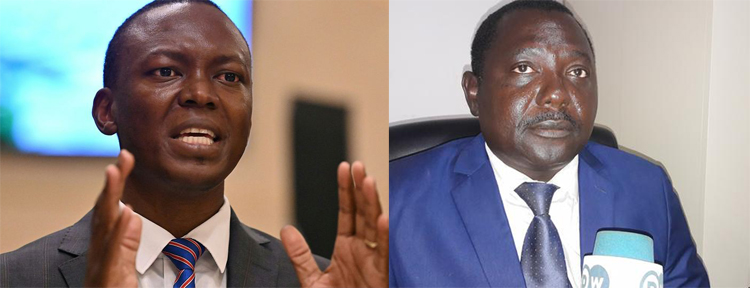
Opposition protests and the unraveling of promised transition to democratic rule.
Succès Masra is the 38-year-old leader of Les Transformateurs, the leading Chad opposition group who fled to the US following the October 20th actions by Chadian security forces against both his party and that of Max Loalngar of Wakit Tama. The Wakit Tama platform is,” We do not recognize the CMT.” Masra is a PhD economist, a graduate of the School of Economics of the Sorbonne, who also earned a Masters in Strategy from Sci.Po and the Catholic University of France in Management. He also received an Archbishop Desmond Tutu Leadership Fellowship at Oxford University. He is a well-published author of books and articles on economic development policies focused on renewable energy for Africa. In 2018, he left his position as Financial Economist & Project Manager at African Development Bank to return to Chad to form Les Transfomateurs to lead a democracy movement in Chad. Loalngar “is a human rights defender and coordinator of the citizen movement, Wakit Tama which mainly focuses on civil and political rights and fights against corruption, bad governance and human rights violations under the current military transition.”
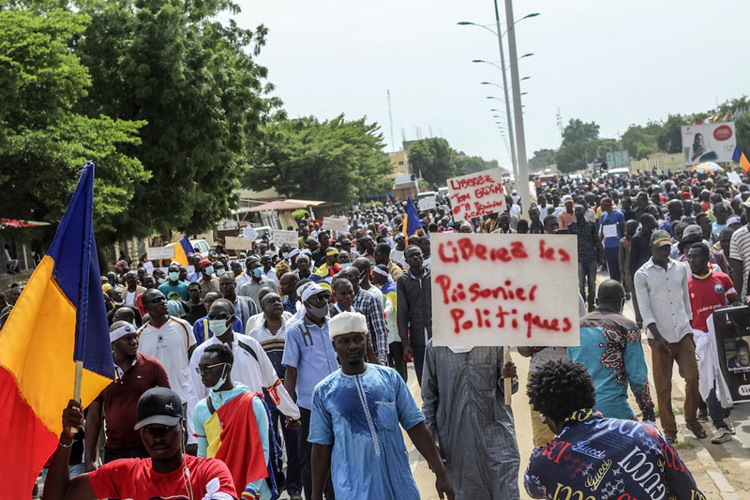
The opposition groups, Les Transformateurs and Wakit Tama had engaged in provocation actions against the backdrop of the Peace Accord discussions, spearheaded by Chad ‘s interim foreign minister, Mahamat Zene Cherif, with over 47 opposition and communal groups that began on March 13, 2022 in Doha, Qatar. On May 10th, the Transitional Military Council announced a so-called “National Reconciliation Dialogue” that was deferred until following the signing of a peace accord with opposition groups. Four days later, on May 14, 2022, a government-authorized opposition protest by Les Transformateurs and Wakit Tama against possible deployment of French forces from Bamako to N’Djamena turned violent with attacks on facilities of French energy giant Total. In the melee 12 police were injured. The result was six opposition leaders, including Wakit Tama s Loalngar and Gounoung Vaima Gan-Fare, secretary of the Chadian Trade Union federation “were arrested and charged with disturbing public order and destruction of property.” Those arrested began a hunger protest on May 23rd. Opposition parties, international NGOs and armed Chadian resistance groups called for their immediate release. A summary trial was held in Moussuro on June 6th, boycotted by defense lawyers amid heavy police presence, resulted in a one year-suspended sentence and 15,000 Euro fines for the six accused. On July 17th, less than 24 hours after the TMC announced setting August 20, 2022 date for a “national dialogue” several opposition groups and parties issued a statement they were leaving the Doha peace discussions. They “accused the government delegation of “harassment, intimidation, threats and disinformation.” Further, they were “not consulted “and objected to the “exclusion of armed groups” —an obvious reference to FACT.
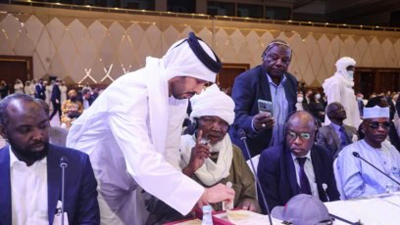
On August 8, 2020, Foreign Minister Cherif announced the military junta peace accord signing with more than 40 opposition, communal and trade union groups to be followed by the announced “national reconciliation dialogue “in N’Djamena on August 20, 2022. The agreement committed to a cease fire with signatories and safety for rebel groups that attended the “national reconciliation dialogue.” One of the signatories cautioned, “Getting this many groups to sign the accord is a good launchpad for the national dialogue, but it will struggle without outfits such as FACT.”
The holdouts were the armed rebel FACT group led by Mahamat Mahdi Ali, whose invasion from his base in Libya perpetrated the death of late President Idriss Deby-Itno, Masra’s Les Transformateurs and Wakit Tama’s Loalngar. One of the sticking points opposed by the major opposition groups Wakit Tamma and Les Transformateurs was the provision that allowed the interim President to run in elections for a new government. Masra, the party’s leader had disrupted the Doha proceedings objecting to possibility of “dynastic rule” if interim President Mahamat Déby ran for President in national elections. FACT, the largest armed rebel group, issued a statement saying, it “rejects the accord that will be put to signatories on Monday.” They added that any FACT rebels who attended the national dialogue “would not be treated equally.” It demanded a new committee be established “to organize the talks, as well as the release of rebel prisoners from government prisons.” Nevertheless, the statement indicated that FACT “would remain available for dialogue anywhere and anytime.” An additional concern of rebel opposition groups was that interim President Mahamat Déby had the right to extend the transition by an additional 18 months beyond the target date of October 20, 2022, if it failed to be concluded. The younger Déby was under pressure from France, the African Union and the US to facilitate the transition on schedule. Over 1,400 Chad groups had signed up for the “national dialogue” in N’Djamena on August 20th that was scheduled to last for three weeks.
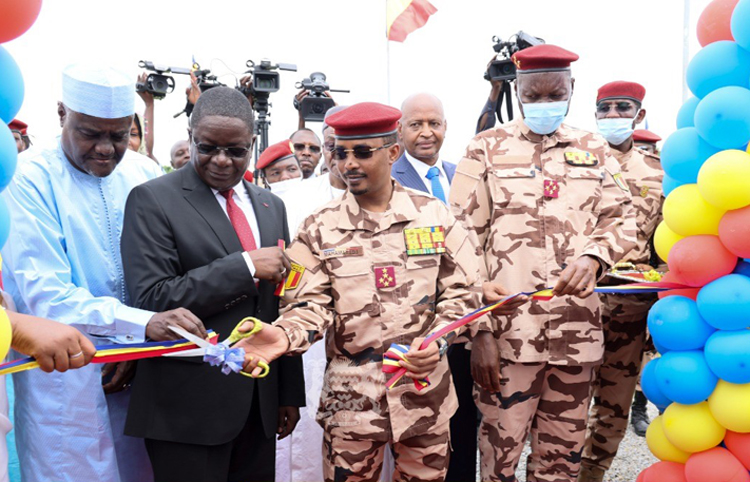
August 20th, 2022 occurred with unrealistic expectations that sought the elusive objective of transition to a democratically elected government that the interim President had promised, following the death of his father in April 2021 to achieve that in 18 months. On August 20th, 2022 Junta leader General Mahmat Idriss Déby unveiled a statue representing “national Unity” touting the “national dialogue” as an “historic moment” for Chad to “open the path to democracy and freedom.” All this while the proceedings were conducted under heavy military presence. The vain hope for the national dialogue was expressed by government spokesperson, Abderamane Koulamallah: “This dialogue should allow us definitively to put recourse to arms behind us.” The tasks on the agenda were formidable: how to achieve lasting peace, reform of judicial system, drawing up a new constitution for a referendum.
The opposition who boycotted the proceedings trumpeted the inevitable failure to achieve these worthy objectives. FACT railed against the proceedings saying the “national dialogue” was “skewed in advance” favoring the military junta. The Wakit Tama opposition group cited the Junta’s “human rights violations” as justification for not participating. Succès Marsa of Les Transformateurs “called for civil resistance at a meeting in N’Djamena attended by several hundred supporters which drew a large police presence.”
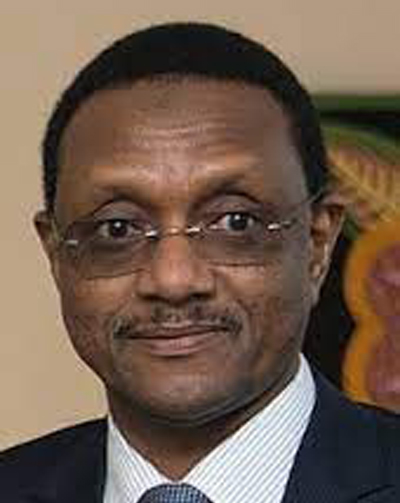
The clock was ticking. Meanwhile behind the scenes at the national dialogue things were unraveling at the Interim transitional military council. On September 19th, interim Foreign Minister Mahamat Zene Cherif summarily resigned accusing the junta of sidelining him as an “extra “effectively undermining his efforts at every turn during the strenuous peace accord negotiations and the “national dialogue.” His resignation letter gave voice to the concerns, both nationally and internationally, that President Mahamat Idriss- Déby had no intention of surrendering his powers betraying his promise to transfer power to an elected democratic government. We note the following excerpts in Cherif’s letter:
“For some months now, my commitment and my will to serve my country have been thwarted by parallel initiatives and actions by certain members of your cabinet and government, undertaken without my knowledge and on your instructions … These repeated and untimely initiatives and interferences are only intended to hinder the exercise of my duties, ” he said, invoking “a situation as unhealthy as it is confusing and unacceptable reducing me to a mere extra.”
The table was set for what occurred on “Dark Thursday,” October 20th, the original transition date promised by interim President Mahamat Idriss-Deby leaving Chad adrift with few prospects for change and building a democratic government, challenging international concerns about whether Chad’s role was imperiled as a trustworthy partner in maintaining stability against Jihadist extremism in the Sahel.
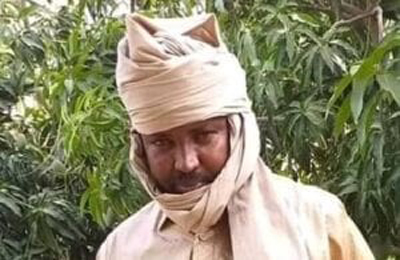
As further evidence of the continuing chaos, on January 5, 2023 Chad government spokesman, Aziz Mahamat Saleh announced that national security service had “foiled a so-called destabilization attempt by 11 military officers allegedly led by human rights activist Baradine Berdei Targuio, President of the Chadian Organization for Human Rights. The government statement charged Targuio and the military officers with “violation of the constitutional order, criminal association, illegal possession of a firearm and complicity.” These actions were pursuant to a magistrate investigation begun on December 8, 2022 when the “plotters had been arrested and detained”.
Targuio had earlier been detained in January 2020 and “kept incommunicado for several months” before being arrested in August 2020 within days “for sharing a Facebook page stating that the late Chadian strongman, President Idriss Deby-Itno was “ill” and that human rights in the Tibesti region had been violated.” Targuio weas sentenced February 18, 2021 on charges of “breach of Constitutional Order” to serve a three-year sentence. He was granted amnesty and released on December 20, 2021.
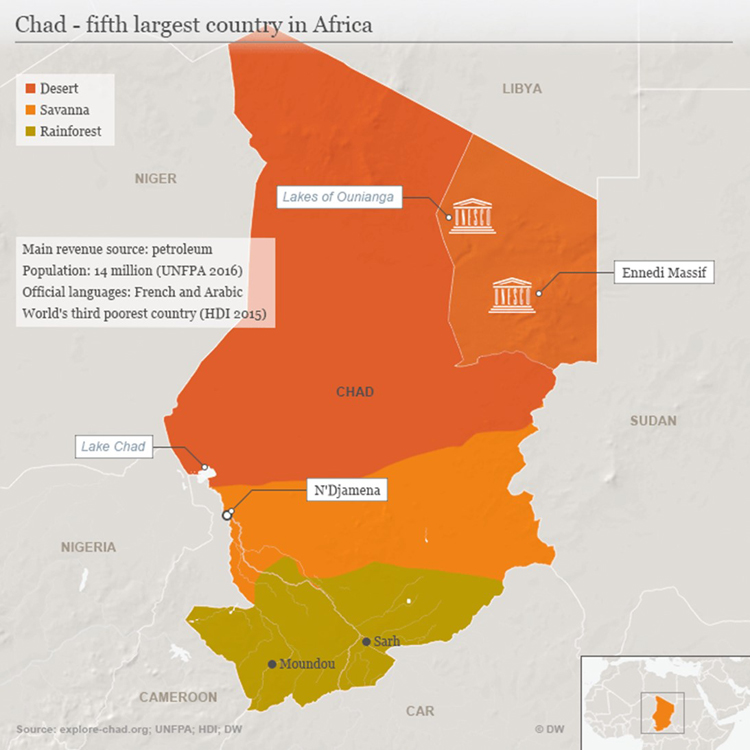
Chad’s Daunting Geo-Political and Economic Development History
Chad is Africa’s fifth largest country with over 495,800 square miles of territory. It is part of the Sahel region that divides North from Central Africa. It borders six countries: Niger, Libya, Sudan, Central African Republic (CAR), Cameroon and Nigeria. Countries that provide havens for rebel opposition forces, Jihadist extremists in Niger and Boko Haram in Nigeria, especially in the lake Chad region. They also host international paramilitary forces exploiting natural resources and providing security for mining operations like Russia’s Wagner Group active in both Sudan and the CAR. The country has three climate zones: Desert in the north, Savanna in the south and tropical rainforests especially bordering Cameroon and the CAR. The country’s population is 16. 4 million, with the average age of 16.3 years. Life expectancy for men is 48.6 years; for women, 52.6 years. Chadians take pride in their children as their “hidden treasure,” if only they were adequately educated. Adult literacy is less than 22.3 percent. 58 percent of the population are Muslim, while Christians represent a significant minority, 34 percent. The latter are concentrated in the country’s south.
Chad’s GDP was $11.78 billion in 2021; $595 on a per capita basis. GDP Growth rate in GDP for 2021 was 1.5%. Inflation in food prices was 16.4%. Oil and Agriculture are the largest sectors of the economy with Oil constituting the bulk of export earnings and government revenues. A majority of Chad’s population “relies on subsistence farming and livestock raising.”
Chad is a poor land with enormous wealth in natural resources: oil, mining, rice and cotton production. Chad has significant deposits of gold, silver, diamonds, quartz and Natron- a source of sodium mined from the bottom of Lake Chad. $135 million of Gold in 2018 was exported to Dubai and the United Arab Republic. Thus, it is surprising that overall, Chad is a poor country, with people living in hunger. 42 percent of the country’s population live below the poverty line.
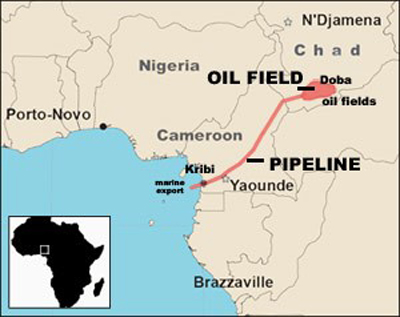
Chad has proven oil reserves of over 1.5 billion bbl. ranking it 39 out of 142 countries. Its annual production of 135,000 bbl. ranks it 37 out of 142 producing countries in the world. The late father of the current President, Idriss Déby had been criticized for running up an enormous World Bank debt of $3.7 billion to construct the cross Sahel underground Chad -Cameroon pipeline for transmission of oil produced in the Doba fields in the country’s southwest to the West African coast for export to the world markets. The objective was to use oil revenues from the sales abroad to fund the country’s development. However, that was often breached. One example was the diversion of $25 million oil bonus payments in 2000 by the late Déby senior in 2000 to purchase $4.5 million of weapons. Oil revenues continue to provide substantial support for Chad’s army seasoned in Sahel regional anti-Jihadist operations.
On July 7, 2022, Africa News/AFP reported the Chad State Oil Company (SHT), and the National Security Agency (NSA) were investigating the embezzlement of 13 Billion CFA francs equivalent to 20 million Euros. Among those subjects investigated were close friends of President Mahamat Idriss- Deb, Among those arrested was the former all-powerful private secretary of General Mahamat Déby, Idriss Youssouf Boy, a cousin and childhood friend of the head of state, who was previously considered one of his closest collaborators. The director general and deputy director of SHT were also accused of being involved and dismissed.
On December 14, 2022, Savannah oil announced that it was terminating a $626 million deal to buy the 40% interest of Malaysian state-owned company, Petronas in the Chad Donbas oil field and Chad-Cameroon pipeline. Thus, imperiling production and oil royalties to the Chadian government that objected to the deal pullout The question is who might step into the breach among world-class oil developers.
Conclusion
Chad’s dynastic autocrat, President Mahamat Idriss Déby on October 20, 2022 upended the promise made at the state funeral of his late Father and legendary strongman on April 21, 2021 to bring democracy and freedom to the country’s impoverished people in this pivotal Sahel county in the forefront of an important regional anti- jihadist campaign.
The brutal suppression of political opposition groups by the military junta has sent its leaders scampering abroad in exile, or into hiding desperately trying to evade a manhunt for their arrest and imprisonment. The faux peace accord signed with other opposition groups in Doha to transit to democratic rule of law has been tossed into the historic wastebin. Once again, the cycle of violence followed by mass arrests of protesters had vanquished any expectation that the sectarian divides of the country’s Muslim versus Christian populations will be healed in national unity. The prospect of removing poverty through education and economic exploitation of the country’s natural resources wealth is once again to languish through corruption and aggrandizement by the Junta’s leadership.
The reality is that regional geo-political priorities will provide support for the Chad junta to remain in power abetted by western interests seeking stability in the strategic Sahel region. Armed rebel groups like FACT will continue to harass and engage in periodic battles from protected bases in Libya. Russia’s paramilitary Wagner Group , now sanctioned by the US Treasury as a “transnational international criminal organization”, might be invited into Chad to secure advantage in both oil and minerals development of Chad, as it has in both neighboring Sudan and the Central Africa Republic.
Table of Contents
Lt. Gen. Abakar M. Abdallah is chairman of the Sudan United Movement (SUM). He is a native of Kutum, North Darfur, who served as a senior intelligence officer, and a Pan Sahel Counterterrorism unit commander in the Republic of Chad Army. He is a graduate of the US Army Intelligence and Security School and the US Army War College, and co-author of Genocide in Sudan: Caliphate Threatens Africa and the World.
Jerry Gordon is a senior editor at New English Review and co-author of Genocide in Sudan: Caliphate Threatens Africa and the World.
Follow NER on Twitter @NERIconoclast
- Like
- Digg
- Del
- Tumblr
- VKontakte
- Buffer
- Love This
- Odnoklassniki
- Meneame
- Blogger
- Amazon
- Yahoo Mail
- Gmail
- AOL
- Newsvine
- HackerNews
- Evernote
- MySpace
- Mail.ru
- Viadeo
- Line
- Comments
- Yummly
- SMS
- Viber
- Telegram
- Subscribe
- Skype
- Facebook Messenger
- Kakao
- LiveJournal
- Yammer
- Edgar
- Fintel
- Mix
- Instapaper
- Copy Link










3 Responses